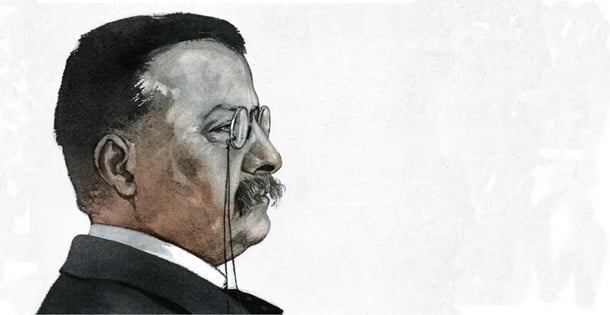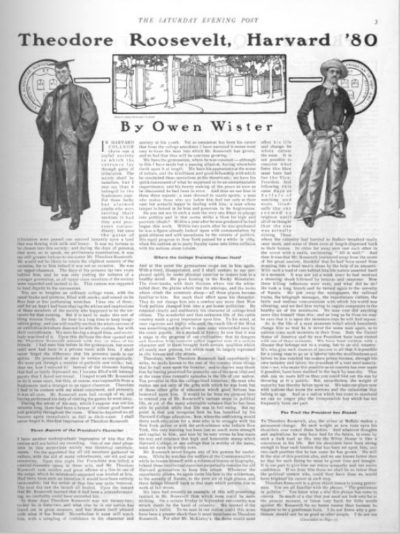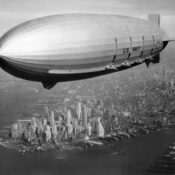The Republican Party was in shock on September 14, 1901; not only was President McKinley dead, but his unpredictable young vice president was taking his place.
Somebody had to stop Theodore Roosevelt.
The charismatic young politician had risen quickly in the Republican party, from New York police commissioner, to assistant secretary of the Navy, to colonel of the Rough Riders in Cuba.
Returning from Cuba, he was asked to run in the 1898 governor’s race for New York. The Republican establishment really didn’t want Roosevelt, but it was either run him or lose the governorship.
After he won, Roosevelt proved to be as troublesome as they expected, advocating corporate taxes, attacking monopolies, regulating railroads, going after political corruption, and promoting civil-service reform and conservation of natural resources — all while generally ignoring the wishes of Republican party officials.
New York’s Republicans wanted him out of the state. They pushed him on to Washington, positioning him to be William McKinley’s vice president. He won the nomination unanimously and helped McKinley win the 1900 presidential election in a landslide. For six months, he chafed in the powerless role.
Then, on September 6, 1901, President McKinley was assassinated. The country was shocked, especially the Republican old guard. The news prompted the national head of the Republican party to say, “Now look, that damned cowboy is president of the United States.”
But young Republicans were delighted. Theodore Roosevelt had been one of the most outspoken proponents of the kind of progressive reform they wanted.
Owen Wister, an aspiring author and an old friend of Roosevelt’s, thought America needed a proper introduction to the new president. In his article for the Post, “Theodore Roosevelt, Harvard ’80,” he presented the Theodore Roosevelt he knew — a man he clearly idolized.
Wister first met Roosevelt when they both attended Harvard. Wister was undergoing an initiation into the Porcellian Club, one of the private clubs for upperclassmen. He doesn’t seem embarrassed at all to recount in his article what must have been a humiliating hazing; he only recounts how much fun Roosevelt seemed to bring to the event.
Wister acknowledged Americans’ anxiety about Roosevelt’s youth and his “cowboy” reputation. But the new president’s love of the outdoors didn’t make him a cowboy, he wrote, any more than working in New York politics turned him into a saloon politician.
Wister’s style is consistent with his era: florid, a little windy, and as stiff as the high, starched collars that men wore at that time. But his article is interesting for its attention to Roosevelt’s privileged background. He seems almost to apologize for Roosevelt’s upper-class background and education. But then, he was writing in an age when the wealthy patricians simply avoided politics.
I have seen too many gentlemen who thought themselves too good to go into politics. I count among my acquaintances strong, healthy, well dressed, educated men, who would rather sit on the decks of yachts, or drink champagne in London and Paris, than lift a finger for their country.
No other country … has … so many people having both the leisure and the equipment to be of use in the Commonwealth who yet frivolously wash their hands of all concern in their country’s welfare.
Wister hoped Roosevelt might encourage other aristocrats to “help manage the Ship of State.”
As he sits in the White House, let all young college boys think of him as the most wholesome example they have ever seen in their lives.
Wister needn’t have worried about the country’s regard of Theodore Roosevelt. When he ran for the office of president in 1904, he won by a landslide, carrying 32 of 45 states. The only states he didn’t win were in the old South, which would never vote Republican no matter how talented and well educated he was.
Featured image: Portrait of Theodore Roosevelt by Edward Penfield from the March 4, 1905 issue of the Post.
Become a Saturday Evening Post member and enjoy unlimited access. Subscribe now




